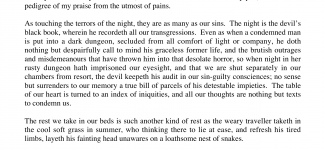Some of the additional material in this edition's brilliant. There's a big chunk from the first version (1961) which was apparently the most extreme form of the book - the later ones having been revised for accessibility - that's incredible.
Motor scooter wings along the rubble road of sputtering arc lights. Nettles, mud wall, Indians shit in rows. Vultures fight for fish heads and tear entrails from other mouths in air, pink eyes pulsing carrion hunger. . .
Patios and porticos littered with flops. An old man with white beard sleeps on the red tile floor, his temple pulsing in the violent dusk. On the Brass and Copper Street purple twilight. Faces of scarred metal. Copper youths spit bloody crystals from rotting lungs. Black gauze feelers on control spots of sex. Touched the head of an Indian boy. Fur of plaintive rodent. Whistling on an empty plain. Vulture wings husk in the dry sound of insects. Giant centipedes in cocoons of black gauze. Green crab people in the broken stellae. Neon claws swept out in the blast of morning by an old junky coughing and spitting in the sick dawn. Blue morning blast. Stale sheets stained with crab time shit. Manipulated spasm serving the brain photo of sex. Scorpion men in tight black suits. Tattoo needle stings etch the frozen spine with cuneiform songs of the centipede goddess. Flickers from every eye. Lighting red pagodas and copper domes. The phosphorescent metal excrement and fatal spasms of the city: (a sleeping youth hanged in wet dream. Bones sucked out by the crab guards). Boy chrysalis in cobwebs of rancid jissom. Brain-eating birds patrol the iron streets. Porticos. Plazas of red tile where brass statues twist in metal combat. Tortured centuries. Copper youths stalk the centipede men. Spitting needles from eyes blue and cold as cocaine crystal. Red nitrous fumes sear the aching lungs of screaming larval peoples clawing at crab parts. In red clay cubicles over a swamp of warm mud bubbles coal gas. The spine cylinder turns crystal locks of ejaculation. Penis flesh invades the face. Withers arm-legs to vestigial insect members. Centipede legs thru the diseased purple flesh. Monster crustaceans boil in black mushroom clouds of West. Fade out to green mist and lichen on ancient rock of Marwan. Under the static red sky.
It's interesting there are no em dashes and only one instance of an ellipsis given the later editions are full of them. The colour thing's really heavy though, lots of reds and blues.
The description of that edition in the intro's really exciting. Shame it's a collector's item now and probably costs a ton.
The 1961
Soft Machine mixes elliptical episodes of science fiction fantasy with ethnographic travelogue, repetitious sex scenes, pulp genre parodies, and a variety of unclassifiable and uncompromising language experiments. The text is so relentlessly bizarre that it seems simultaneously
impossible to read and yet - unlike the second and third editions, where the reader is left confused by non-narrative sections - not in the least frustrating. Instead of a narrative scenario, it is dominated by long image-lists (redolent of, and sometimes cutting up, the prose poems of Rimbaud and St. John Perse) that depict toxic landscapes - swamps, jungles, canals, rotting cities of concrete pillars and bamboo bridges - and whirling machinery - penny arcades, Ferris wheels, pinball machines, cable cars, elevators. Ginsberg described it as "page after page of heroic sinister prose poetry." Although the polluted wastelands clearly develop out of
Naked Lunch , the dominance of South American locations and the recurrent use of Spanish signals Burroughs' vision of a new global colonialism, the planet's occupation by an alien empire: Trak Utilities - the dominant corporation in
The Soft Machine, precursor of the Nova Mob in
Nova Express and
The Ticket That Exploded - extends the imperial ambitions of sixteenth-century Conquistadors from the New World to the whole of reality. ("You can't walk out on Trak," Burroughs would clarify for the revised text; "There's just no place to go.")

